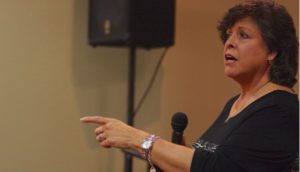Importance of Truth and Reconciliation stressed at Lakehead University’s Aboriginal Awareness Centre Speaker Series

By Rick Garrick
THUNDER BAY—Georgina Island’s Cynthia Wesley-Esquimaux stressed the importance of truth and reconciliation for all Canadians during her Jan. 12 presentation at Lakehead University’s Aboriginal Awareness Centre Speaker Series.
“It’s not only healing for First Nations people or Métis people, it’s healing for everyone because Indigenous people are not the only ones who have to heal from this experience, it’s also the rest of Canada,” says Wesley-Esquimaux, Lakehead University’s chair on truth and reconciliation. “Many people came out and actually supported that conversation. In B.C. alone, when they did a walk of support for residential school survivors, 7,000 people came out to walk with the Indigenous community to give their support and to share with them the need to make this right.”
Wesley-Esquimaux says the truth and reconciliation process requires the voices of Canadians across the country.
“There are about two million Indigenous people in Canada,” Wesley-Esquimaux says, noting there are also about 33 million other people in Canada. “So you need to understand that when we talk about truth and reconciliation, we are talking to you because there is no way, in spite of the loud voice that Indigenous people have in this country, there is no way that two million people are going to be able to move that particular mountain on their own. It’s going to require your voices and your support and your understanding.”
Wesley-Esquimaux says an access point will be set up at Lakehead University for the information that was gathered by the Truth and Reconciliation Commission.
“Seven years of truth telling has been recorded and it is now accessible to you,” Wesley-Esquimaux says. “So those documents, if you want to see them, you will be able to see them, but not all of them because there is a whole component of documents that were done through an adjudicated process that was very intense and very private and very personal and very scary.”
Wesley-Esquimaux wants to see a more balanced education provided for students, noting that she quit high school because she got tired of being called racist names. She later went back to school and earned her high school diploma and university degrees.
“The goal is that your children, through the reconciliation process, will go to school and will learn a true balanced history that will allow them to accept each other as equals, as human beings,” Wesley-Esquimaux says. “That is the goal, that there be no discrimination and there be no unequal treatment.”
Wesley-Esquimaux delivered her presentation to a group of students and community members at Lakehead University’s The Study Coffeehouse. The Speaker Series features local Indigenous leaders or scholars speaking on a specific topic.
“I thought there was a great turnout — obviously people are interested in reconciliation and truth and they want to have a conversation about it,” Wesley-Esquimaux says. “People were a little reluctant to say what reconciliation might mean, but at least a few of them stood up and said: ‘Well, it means this to me and I think we need to do more.’”
Mishkeegogamang’s Erin Bottle brought her two children to the Speaker Series to introduce them to the truth and reconciliation process.
“Reconciliation also begins with our children too, to have them as part of the dialogue because they are going to be carrying forth that dialogue and discussion,” Bottle says. “So I think it is imperative to hear what they’ve got to say about the talks.”


